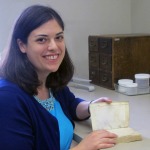 This Fellow Reflection was written by Brenna Campbell, a Rare Books Conservator at Princeton University Library. She is a member of the American Institute of Conservation (AIC) and attended the DLF Forum with support from a Kress + DLF GLAM Cross-Pollinator Fellowship. A note: we are still accepting applications for a reciprocal opportunity to send a DLF-affiliated professional to AIC. Apply by March 1, 2017.
This Fellow Reflection was written by Brenna Campbell, a Rare Books Conservator at Princeton University Library. She is a member of the American Institute of Conservation (AIC) and attended the DLF Forum with support from a Kress + DLF GLAM Cross-Pollinator Fellowship. A note: we are still accepting applications for a reciprocal opportunity to send a DLF-affiliated professional to AIC. Apply by March 1, 2017.
When I arrived in Milwaukee for the DLF Forum, I wasn’t entirely sure what to expect. I had pored over the schedule, and tried to choose talks that struck a balance between familiar territory and new information. As a rare books conservator, I regularly participate in digitization projects, but in a very limited way; I assess collection materials to be imaged for structural stability, and consult on techniques for imaging materials that are vulnerable. I knew all along that my involvement was a small piece of the digitization workflow, and a tiny fragment of the larger world of digital libraries. Even with that knowledge, I was truly dazzled by the range of topics covered over the three days of the Forum, and by the productive, collaborative energy of the attendees, presenters, and organizers.
Some of my favorite talks extended well beyond my area of expertise. I was fascinated by Tanya Clement’s talk about using machine learning techniques to identify applause and other non-word information (such as laughter, pitch, pauses, etc.) in recordings of poetry readings from the PennSound audio archives at the University of Pennsylvania. This research is part of an NEH-funded project to develop open-source software to automate metadata description for undescribed sound collections. I also found Matthew Miguez’s presentation on metadata visualization both intriguing and visually beautiful. Devin Becker and Evan Williamson’s talk about the Vandal Poem of the Day project at the University of Idaho was entertaining and inspiring, as well.
I also took home interesting tips and resources for my own work, including Scott Eldredge’s presentation of a “Lazy Susan” style scanning table, and Laura Smart’s discussion of browsing artists’ books with linked data visualization.
Finally, during a week that was at times difficult and emotional, I was heartened and moved by the social justice emphasis of many presenters’ work. In particular, Scout Calvert’s reflection on the ways in which traditional genealogy fails to reflect the full range of kin relationships was eye-opening and extraordinarily well-articulated. Jason A. Clark’s presentation on metadata and annotation for hip hop music expanded my perception of how metadata can help us describe and understand the world around us.
For me, the overarching theme of the Forum was optimism about the potential of technology to be a tool for justice. It was inspiring and encouraging to learn about innovative projects with the explicit aim of building a better future. I would like to thank the Digital Library Federation and the Samuel H. Kress Foundation for this amazing opportunity and wonderful experience.
